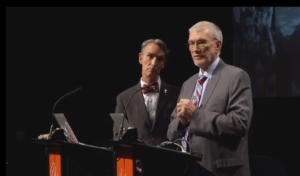Last night’s G.O.P debate was notable for many reasons, but it was a particular low point for anyone concerned about public science literacy. It’s becoming increasingly evident that the G.O.P. candidates are being duped by a false narrative of political polarization on the issue of vaccine safety. And that is alarming.

The CNN moderator for the debate last night asked Dr. Ben Carson, a neurosurgeon, to respond to Donald Trump’s often repeated assertion of a link between vaccines and autism. That link is a lie, but neither Dr. Carson nor Dr. Rand Paul (an ophthalmologist) called it out as such. Dr. Carson vaguely (but correctly) stated “There has — there have been numerous studies, and they have not demonstrated that there is any correlation between vaccinations and autism,” and “Vaccines are very important,” but then he qualified this by saying “Certain ones. The ones that would prevent death or crippling. There are others, there are a multitude of vaccines which probably don’t fit in that category, and there should be some discretion in those cases,” and “You know, a lot of this is — is — is pushed by big government.” Dr. Paul didn’t do much better, saying “I’m all for vaccines, but I’m also for freedom.”
(Source for transcribed quotes)
Let’s be perfectly clear: None of the objections Trump raised to vaccines have the slightest basis in biology, medicine, or reality. None. Not one. Nor does the “too many too soon” argument that Dr. Carson floated. As Tara Haelle put it:
“The problem is, our country doesn’t make or recommend vaccines that aren’t important, that don’t prevent death. So, I have a question for Dr. Carson. Below are the vaccines recommended through age 18. I’d like to know which one of these we should “use discretion” with. Which ones are not important enough to administer?”
You can check out the list and the rest of her article here.
Trump will be Trump, but we deserve more from the two physicians in this race. To be honest, I believe that both of them understand and accept the science on vaccines, but they’re pandering to what they believe Republican voters want to hear. But study after study has shown that vaccines are not a partisan issue–the same proportions of conservatives and liberals both accept that they are safe, sound, and necessary to combat infectious disease. Carson and Paul are completely out of touch with conservatives on this issue, and unfortunately their assumption about what their base wants to hear on this issue may itself change those numbers. Colin McRoberts discussed the potential consequences of turning this into a partisan issue a few months ago:
“Right now, most people support vaccination and reject anti-vaccine talking points. (I know that can seem implausible, given how visible those hoary anti-science stories are online. But vaccination rates don’t lie—the vast majority of parents reject anti-vax scaremongering.) If we start drawing party lines on top of the vaccine debate, people will start to use their party affiliation to define their position on vaccines. They won’t realize they’re doing it. They’ll honestly think they’re making decisions about vaccines based on the facts. But they’ll be judging those facts based on the community they belong to, the way we all do. So we can’t let those communities be defined as anti-vax communities!”
Amy Davidson, writing for The New Yorker, nicely articulated the dangers of having presidential candidates giving legitimacy to dangerously unscientific positions:
“A lot of what Trump says—diplomacy by yelling, for example—would be dangerous if put into practice. But most of it, assuming he doesn’t actually get elected, won’t be put into practice. The refusal to inoculate children, though, is something that his admirers can try at home. No other candidate was willing to anger the ideologues by standing up for something as suspicious as science.”
We have seen the consequences of not vaccinating children earlier this year. Do we really want more outbreaks of preventable disease to threaten our communities? The use of vaccines to protect the health of our children is not a Democratic issue or a Republican issue. It’s not a liberal or conservative issue. It’s simply what the best science available overwhelmingly supports. I urge conservatives in the Republican party to make this point to your representatives. Only the base can hold the leadership to account, and this is one issue where we all need to take a united stand.



